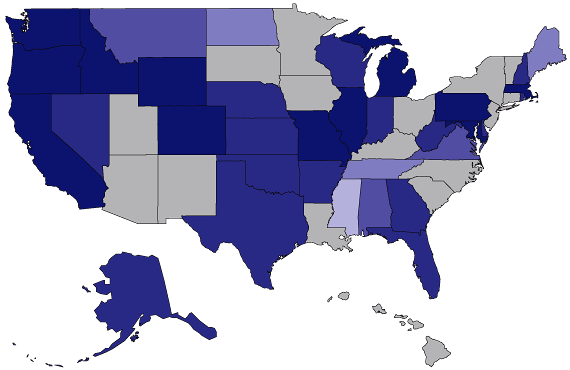Improving Cancer Tracking Today Saves Lives Tomorrow: Do States Make the Grade?
More than 30 years after the launch of the national War on Cancer, the disease remains the top health concern of Americans. This report examines how well state health agencies are doing in their efforts to track, control and prevent cancer, and awards grades on a state-by-state basis.
More than 30 years after the launch of the War on Cancer, the disease remains the top health concern of Americans. Despite advances in diagnosis and treatment, cancer is still responsible for one of every four deaths in the U.S. Cancer illness and deaths annually cost the nation more than $180 billion in health care spending and lost productivity. The American Cancer Society (ACS) estimates, however, that one-third of cancer deaths could be prevented.
Information is the most vital tool for finding ways to more effectively treat and prevent the disease. Health agencies in each state are responsible for compiling information about the rates of cancer to study patterns and trends. These “cancer tracking” efforts are essential to help find cures, improve treatments and develop strong public health initiatives aimed at reducing cancer rates.
This report examines how well state health agencies are doing in their efforts to track, control and prevent cancer, and awards grades on a state-by-state basis. It concludes that states are missing key, important opportunities to reduce cancer rates.
According to the report findings, most states perform very well at maintaining high quality data about cancer rates. However, findings also revealed cancer control and prevention could be greatly enhanced if increased efforts were made to connect cancer tracking information and other sources of health information on a routine and systematized basis. Additionally, the survey revealed a gap in the ability of states to answer the public’s questions about disparities in cancer rates among different ethnic groups and communities.
Trust for America’s Health (TFAH) offers specific recommendations for how cancer tracking could be improved to increase prevention efforts and reduce the burden of cancer on families, communities and the nation.

| A | B | C | D | F | N/A |
| California Colorado Idaho Illinois Maryland Massachusetts Michigan Missouri Oregon Pennsylvania Washington Wyoming |
Alaska Arkansas Delaware District of Columbia Florida Georgia Indiana Kansas Nebraska Nevada New Hampshire Oklahoma Rhode Island Texas West Virginia Wisconsin |
Alabama Montana Virginia |
Maine North Dakota Tennessee |
Mississippi | Arizona Connecticut Hawaii Iowa Kentucky Louisiana Minnesota New Jersey New Mexico New York North Carolina Ohio South Carolina South Dakota Utah Vermont |